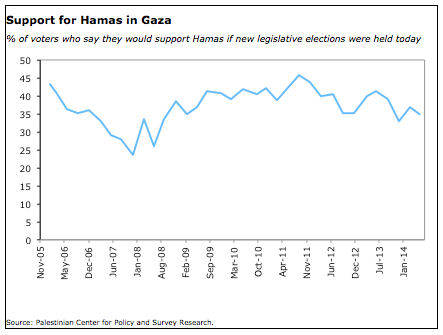Michael Robbins and Amaney Jamal discuss how Israel’s blockade of the Gaza Strip has completely failed at its intended goal of wearing down the Islamist group:
[N]ot only has the blockade failed to stem the tide of rockets falling into the hands of Hamas, but it has also failed to weaken Hamas as a movement. If anything, Hamas appears to be stronger and have a broader base of support in Gaza than before the blockade was put in place. Despite the widespread suffering of many Gazans – particularly opponents of the movement – this outcome should not be unexpected. Hamas leaders readily admit that their popularity derives from Palestinian anger at Israeli policies. In a 2008 interview with one of the authors, a senior Hamas official said that his movement’s electoral success boiled down to a single question the movement posed to Palestinians during the 2006 campaign: “Israel and the U.S. say no to Hamas – what do you say?”
Israel’s direct attempts to confront Hamas ultimately benefit the movement and, insofar as Israel seeks to weaken Hamas, the ongoing blockade is a self-defeating strategy. Given domestic political constraints, it will be difficult if not impossible for Prime Minister Benjamin Netanyahu’s government to lift the blockade, which could be seen as appeasing Hamas. Its lifting would also be a major victory for Hamas, at least in the short term. Yet if history is any guide, its continuation will not serve to weaken or isolate Hamas, but to help maintain its strength as a movement.
Jimmy Carter and Mary Robinson want Hamas recognized rather than bombed, arguing that this is the only way to ever get them to disarm:
The international community’s initial goal should be the full restoration of the free movement of people and goods to and from Gaza through Israel, Egypt, and the sea. Concurrently, the United States and EU should recognize that Hamas is not just a military but also a political force. Hamas cannot be wished away, nor will it cooperate in its own demise. Only by recognizing its legitimacy as a political actor — one that represents a substantial portion of the Palestinian people — can the West begin to provide the right incentives for Hamas to lay down its weapons. Ever since the internationally monitored 2006 elections that brought Hamas to power in Palestine, the West’s approach has manifestly contributed to the opposite result.
